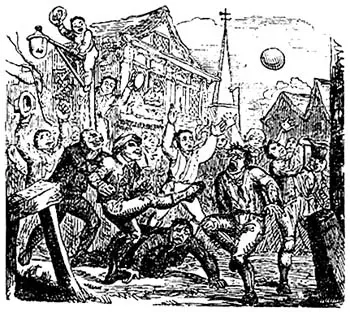December 5
Thank you to historian and author Toni Mount for today’s Advent treat...

In medieval times, as now, football was a popular winter ‘disport’, despite a number of kings trying to ban the game by law. This is how a late fifteenth-century monk in Surrey, Alexander Barclay, described the game on a chilly winter day:
Each one contendeth and hath great delight
With foot and with hand the bladder for to smite:
If it fall to ground they lift it up again,
This wise [way] to labour they count it for no pain,
Running and leaping they drive away the cold,
The sturdy ploughmen lusty, strong and bold,
Overcometh the winter with driving the foot ball,
Forgetting labour and many a grievous fall.
(Collins, M. & Davis, V., A Medieval Book of Seasons, p.129.)
Perhaps it was more like rugby, since players could handle the ball. The ball wouldn’t have bounced either, being a stuffed pig’s bladder.
William FitzStephen was the first mention of football, in 1170, when he was visiting London: ‘after dinner all the youths of the city go out into the fields for the very popular game of ball’. He also mentioned that every trade had its own football team. The name ‘football’ referred to the game being played on foot, rather than on horseback, and not to using only your feet. Any part of the body was allowed to be used to propel the ball. The game often took place in the open country but sometimes in towns and villages which caused quite a commotion and property damage.
The ‘goals’ were sometimes miles apart and there were no rules. The teams may have consisted of 300 to 500 people each. Wrestling, punching and kicking were allowed and injuries to the players were quite usual. In some cases, the injuries were so bad that they led to the death of the participants. In one case:
Henry, son of William de Ellington, while playing at ball at Ulkhamon on Trinity Sunday with David le Ken and many others, ran against David and received an accidental wound from David’s knife of which he died on the following Friday.
In another:
During the game at ball as he kicked the ball, a lay friend of his, also called William, ran against him and wounded himself on a sheath knife carried by the canon, so severely that he died within six days.
Despite the rowdiness of the game, there were versions of football played by women. Often the two teams would be the married women against the unmarried ones. In 1314, King Edward II became concerned that football was a waste of energy and time for men who should be practising their skills with the bow and tried to ban it. In 1331, his son, Edward III, was focused on war so he reintroduced the ban. In 1477, Edward IV passed a law that ordered:
No person shall practise any unlawful games such as dice, quoits, football and such games, but that every strong and able-bodied person shall practise with bow for the reason that the national defence depends upon such bowmen.
However, plenty of records show that young men who loved the game refused to accept the bans. Many people were fined or arrested for playing ‘unlawful games of football’. Despite this, some believed that football had its benefits as well, especially to the health of its participants. Richard Mulcaster, the headmaster of the Merchant Taylors’ School, claimed that football:
great helps, both to health and strength. It strengtheneth and brawneth the whole body and by provoking superfluities downward, it dischargeth the head and upper parts, it is good for the bowels and to drive the stone and gravel from both the bladder and kidneys.
Excerpt is taken from from A Year in the Life of Medieval England by Toni Mount, “an almanac for lovers of all things medieval”. Toni cites “The History of Football: Medieval Football, Pt. 1” by Stefan Vasilev - https://bleacherreport.com/articles/122315-history-of-football-medieval-football-part-1
Toni is the author of several non-fiction history books and also the Seb Foxley medieval mystery series which begins with The Colour of Poison. You can find out more about Toni at ToniMount.com and her mystery series at SebastianFoxley.com.
